Best beginner DSLR cameras 2021: 7 cheap DSLRs perfect for new users
These are the very best entry-level DSLRs you can buy
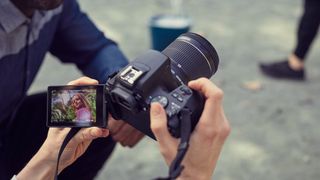
Looking for the best beginner DSLR you can buy? If the time has come for you to upgrade from your smartphone or compact, this buying guide will help you find the perfect first DSLR to suit your skills and needs.
Smartphones and mirrorless cameras might be the most popular photography formats nowadays, but the DSLR is far from dead. DSLR (or digital single-lens reflex) cameras still offer greater shooting power and control than most mobiles, as well as superior physical handling and battery life compared to the majority of mirrorless cameras. And if you want a true viewfinder – one that uses a mirror to reflect light directly to your eye, rather than a small electronic display – you’ll only get that with a DSLR.
With most camera makers focused on developing mirrorless models, there aren’t many new DSLR cameras hitting the shelves in 2020, which is actually beneficial to first-time buyers. Alongside the occasional newer model – such as the feature-packed Canon 90D – there’s a whole range of slightly older but very capable DSLR cameras on the market. And thanks to their age, they're very competitively priced.
What’s the difference between basic variants and more advanced models, such as the Canon EOS 1DX Mark III? Entry-level DSLR cameras tend to be more limited when it comes to features, custom settings and the degree of control offered – but they still promise more than enough flexibility to keep novice DSLR users occupied.
Keen to jump in? The established giants of the genre – Canon and Nikon – continue to offer the greatest choice, courtesy of their long DSLR lineage and extensive lens collections. That said, the list below also includes a selection of very capable cameras from other brands, as well as certain older models that still offer excellent value for DSLR beginners.
Best beginner DSLRs 2021 at a glance:
Why you can trust TechRadar
- Nikon D3500
- Canon EOS Rebel T7i / EOS 800D
- Nikon D5600
- Canon 90D
- Canon EOS Rebel T7/ 2000D / EOS 1500D
- Canon EOS Rebel SL3 / EOS 250D / EOS 200D Mark II
- Pentax K-70

The Best DSLRs for beginners in 2021:
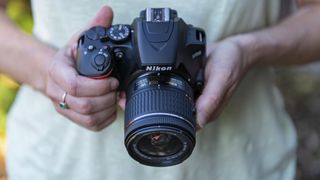
1. Nikon D3500
Our expert review:
Specifications
Reasons to buy
Reasons to avoid
Nikon may not have announced any new entry-level DSLRs for a while, but the D3500 remains an excellent option for those new to photography. It picks up from where the D3400 left off, but with a handful of extra perks. Unlike power-hungry mirrorless models, the major advantage of this camera is battery life. You can keep going for 1,550 images between charges, which is way ahead of most other DSLRs, while the 24MP sensor delivers excellent image quality. Nikon has also revised the body and control layout, not only to make it nicer to handle but easier to use too, while the Guide Mode takes the first-time user's hand and walks them through all the key features in a way that makes everything easy to understand. We love it – and if you're just getting started, we reckon you will too.
- Read our in-depth Nikon D3500 review

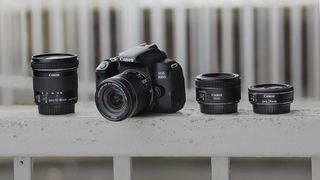
2. Canon EOS Rebel T7i / Canon EOS 800D
Specifications
Reasons to buy
Reasons to avoid
Canon’s EOS Rebel T7i (known as the EOS 800D outside the US) might be a little dated, but it still sits at the top of Canon’s entry-level EOS DSLR line-up – at least for now. Its successor, the 850D, is on the horizon and due to deliver several key upgrades. As our Canon 850D vs 800D feature shows, the new model is more evolution than revolution, taking the capable core of the 800D – resolution is essentially the same, for example – and adding 4K video, better low-light focusing and Live View focus points. Canon’s latest Digic 8 chip will also add 7fps burst shooting, better noise-handling and improved metering. So should you forget about the 800D and wait for its usurper? Not necessarily: if 4K footage isn’t a deal-breaker, the 800D remains a solid all-round option for those who like the heft and handling of a DSLR. It offers a user-friendly interface, excellent touchscreen control and a 24.2MP sensor that delivers impressive overall image quality. What’s more, with the 850D on the way, prices for the 800D have fallen significantly, making it better value than ever.
- Read our in-depth Canon EOS Rebel T7i / EOS 800D review

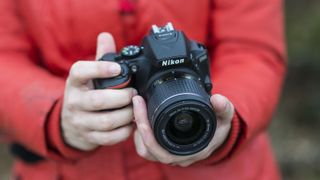
3. Nikon D5600
Specifications
Reasons to buy
Reasons to avoid
Here's another model which is still holding its own against the rise of mirrorless. The D5600 is a step up from the D3000-series models, with a stronger set of specs to rival the likes of the Canon EOS Rebel T7i / EOS 800D (position 2). Key advantages over the D3400 and D3500 include a larger LCD screen, which not only flips out and swivels all the way around to face the front for vlogging, but also responds to touch, together with a more advanced autofocus system, Wi-Fi and a healthy range of additional control on the inside. Sure, you pay a little bit more for the privilege, but if you need a little more growing space it makes sense to go for the D5600 so that it stays with you for years to come.
- Read our in-depth Nikon D5600 review

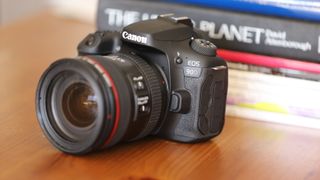
4. Canon EOS 90D
Specifications
Reasons to buy
Reasons to avoid
Canon’s 90D might be the last enthusiast-level DSLR the company ever makes – and if so, it’s going out with a bang. The versatile 90D packs a high-resolution sensor which, paired with Canon’s Digic 8 imaging engine, offers the enticing prospect of uncropped 4K video at 30fps. Colour reproduction is superb and there’s plenty of detail in both stills and video, aided by a new 216-zone metering system – though noise can be an issue above ISO 8000. A deeper grip means the 90D is also really comfortable in the hand, while a joystick makes selecting from the Dual Pixel CMOS AF points a cinch. Battery life is a boon, too, with 1,500 shots possible on a single charge. It's possibly a bit too much camera for an absolute beginner (both in price and features), but there's no doubt it offers a lot of room to grow into. Either way, the 90D proves that DSLRs still have a place in the mirrorless world.
- Read our in-depth Canon EOS 90D review
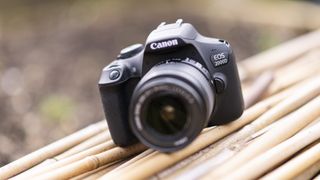
5. Canon EOS Rebel T7 / Canon EOS 2000D
Specifications
Reasons to buy
Reasons to avoid
This is one of the cheapest DSLRs in Canon's current line-up, which also makes it a very cost-effective way to get access to an endless assortment of lenses, flashguns and other accessories. Its low price tag means that it understandably lacks some of the fancy tricks of its bigger brothers – flip-out LCD, 4K video and so on – but there's still a very good level of physical control on offer. And, most importantly, image quality from the 24MP sensor is sound. It's designed very much with its target audience in mind, with a Feature Guide to help you understand everything, and battery life is also better than many mirrorless models at this price point – still a key advantage of DSLRs. Wi-Fi, NFC and Full HD video recording round off the specs, making it a well-rounded first-time option.
- Read our in-depth Canon EOS Rebel T7 / EOS 2000D review


6. Canon EOS Rebel SL3 / EOS 250D
Specifications
Reasons to buy
Reasons to avoid
The EOS Rebel SL3, also known as the Canon EOS 250D, is the latest entry-level arrival to this list – indeed it's one of only a handful of beginner models announced in recent years. Like its name suggests, it picks up from where the Rebel SL2 (EOS 200D) left off, adding a fresh processing engine and 4K video recording on top of a collection of smaller extras. There may be lots of competition from mirrorless right now, but if you like the traditional handling of a DSLR – including an optical viewfinder – the 250D is one of the most attractive models available right now.

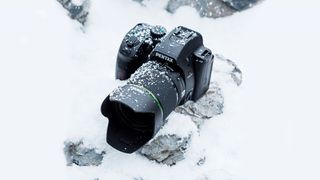
7. Pentax K-70
Specifications
Reasons to buy
Reasons to avoid
Although a couple of years old now, the K-70 remains a good value option for anybody who is not overly bothered by the main two manufacturers . Even better if you have a stash of old Pentax lenses gathering dust in a basement from manual days. It has a very useful articulating screen, while the hybrid live view autofocus system makes it an actual practical alternative to using the viewfinder. Possibly our favourite thing about the K-70 is its tough credentials - something which is typically lacking for entry-level models. If you're keen to take lots of pictures outdoors - such as landscapes - being able to rely on it not to be destroyed by inclement weather is a big bonus. One slight disappointment is the kit lens which is often bundled with the camera – while it offers a much longer focal length than most others here, it can be a little soft in places.

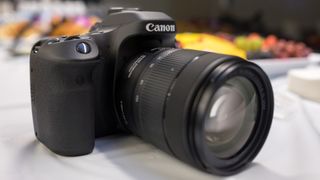
7. Canon EOS 80D
Specifications
Reasons to buy
Reasons to avoid
Sitting on top of Canon's entry-level DSLR pile, the EOS 80D is one of the older cameras from the camera maker, having been around since 2016. Despite that, it's one of the more 'advanced' beginner cameras, thanks to its feature set and specs, including a 24.2MP sensor with a 45-point autofocus system that's actually remarkably reliable. There's a guided menu system that's easy to navigate, and on-board Wi-Fi and Bluetooth to transfer images wirelessly if needed. The only downside is that the kit lens that comes with the shooter is a tad soft around the edges, and we'd recommend buying the body only and a better lens separately.
- Read our in-depth Canon EOS 80D review

Also consider...
None of the above take your fancy? Here's another option to consider.
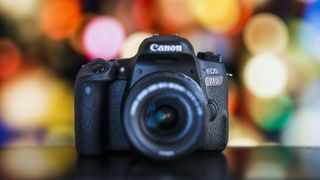
Canon EOS 77D
Specifications
Reasons to buy
Reasons to avoid
The EOS 77D is a slightly more advanced beginner DSLR, and it provides a few extra treats for those who feel they may outgrow more basic models before long. While we weren't too excited about it at the time of its release, the fact that it's spent some time on the market now means it can be bought for a much more agreeable price tag. On top of the bones of the EOS 800D, there's a top-plate LCD screen that gives you shooting options at a glance, as well as two control dials to make adjusting options faster. You also get some extras on the inside such as bulb and interval timers. If you can stretch to the EOS 80D that sits just above it, even better – otherwise, this would be a slightly more capable option than its more basic siblings.
- Read our in-depth Canon EOS 77D review

What should you look for when buying a beginner DSLR?
There are three main factors to consider when buying a beginner-friendly DSLR: the camera's size, screen and kit lens options.
If you're trying to learn your way around manual settings like aperture and shutter speed, which is one of the main benefits of a DSLR, then you'll ideally need a model that's small and light. This means you'll be more likely to take it out regularly and master those controls. The most beginner-friendly cameras, like the Nikon D3500 and Canon 250D, tend to be particularly small for DSLRs, so take a close look at those.
Looking to shoot lots of video along with your stills? DSLRs can be a cheap way to get into vlogging too, so make sure you look out for models with a vari-angle screen if you need this. These can help you shoot from different angles and also flip round to the front so you can check your framing while vlogging to camera.
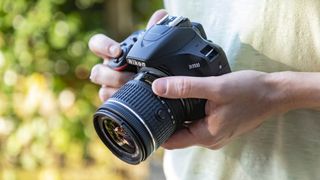
Lastly, you'll want to consider lenses. As a beginner, you'll most likely be starting from scratch, which means it makes more sense to buy your DSLR with a kit lens. A word of warning here, though – most manufacturers offer two types of kits lens, one with image stabilisation and one without. It's best to go with the image-stabilised kit lens, as you'll be able to shoot sharper images at slower shutter speeds.
While an 18-55mm kit lens will be more than enough to get you started, one of the big benefits of DSLRs is being able to add extra lenses for different kinds of photography. For example, wide-angle and telephoto zoom lenses, as well as high-quality macro options. You can also add a flashgun and other accessories, which help you to make the most of whatever types of photography you're into.
Still not entirely sure whether you need a DSLR or a mirrorless camera? Don't forget to check out our Mirrorless vs DSLR cameras: 10 key differences guide. Alternatively, if don't quite know what kind of camera you need at all, then read our easy-to-follow guide to camera types: What camera should I buy?
Should you buy a mirrorless camera over a DSLR? Watch our guide video below to learn more:
- Best camera
- Best DSLR
- Best mirrorless camera
- Best 4K camera
- Best full-frame camera
- Best compact camera
- What camera should I buy?
- Mirrorless vs DSLR: 10 key differences
- Camera rumors

Get the best Black Friday deals direct to your inbox, plus news, reviews, and more.
Sign up to be the first to know about unmissable Black Friday deals on top tech, plus get all your favorite TechRadar content.

Mark is TechRadar's Senior news editor. Having worked in tech journalism for a ludicrous 17 years, Mark is now attempting to break the world record for the number of camera bags hoarded by one person. He was previously Cameras Editor at both TechRadar and Trusted Reviews, Acting editor on Stuff.tv, as well as Features editor and Reviews editor on Stuff magazine. As a freelancer, he's contributed to titles including The Sunday Times, FourFourTwo and Arena. And in a former life, he also won The Daily Telegraph's Young Sportswriter of the Year. But that was before he discovered the strange joys of getting up at 4am for a photo shoot in London's Square Mile.
Most Popular


